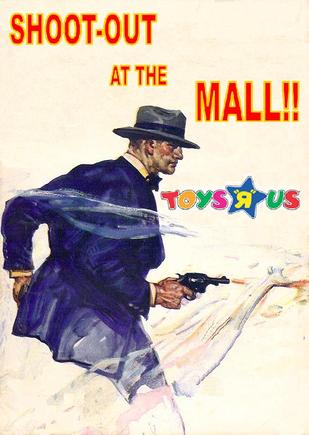
Well, the ex-president didn’t actually pay it, seeing as how he passed on in 1972. But when the Truman Library and Museum realized he had never paid the $7.50 he owed 15-year-old paper boy George Lund back in 1947, officials decided to make good to the tune of $56.63 — the amount due plus interest.
Lund, who now is 80, said he just figured the president was too busy with other things at the time to bother with a paperboy in Independence, Mo. The payment took place earlier this year at a retirement community and, in keeping with Truman’s “the buck stops here” motto, Lund was paid in $1 bills.
I imagine wherever ol’ Harry is right now, he’s feeling a sense of relief.
Honesty and goodness can’t be measured by size. They
| | “I ran to the car, threw it in the front seat and locked my doors, looking for drug dealers following me,” she said. are things you either have or you don’t. Because of holiday deadlines, I’m writing this before “black Friday” (or is it “black Thursday” now?) If history holds, it will be a time of pushing, coveting and desperate grabbing, and much of this bad behavior won’t be done with the intent of giving to anyone else. According to marketingcharts.com, one study has found that 8 in 10 Black Friday shoppers intend to buy things for themselves. That’s a confusing way to kick off a season that is supposed to be marked by generosity, love and charity. The annual convergence of consumerism’s biggest moment with the celebration of Christ’s birth can breed some stark inconsistencies. The only time I decided to experience black Friday — on a cold predawn nine years ago — I felt anything but the Christmas spirit. The woman who kept ramming me from behind with her shopping cart didn’t have what I would call a child-like gleam in her eyes. So it can be both instructive and calming to turn from the chaotic scene of holiday madness and look at examples of people who put honesty ahead of everything else. If you look for such things, you quickly find that Truman’s museum is just a minor example in a flood of the virtue-over-profit spirit. You’ll find the 13-year-old boy in New Zealand who returned a wallet containing $80 and credit cards to a jogger who lost it on a beach. The jogger said it restored his faith in human nature. You’ll find a woman in the Boston area who last week thought she might have found the perfect gift for her daughter-in-law in a department store. Then she realized the handbag hanging on a rack belonged to someone, and it had $11,000 in cash inside, all in rolled-up $100 bills. The woman, Cheryl Gavazzi, could have left it hanging, but she decided the right thing to do was to turn it into the police. She didn’t want to trust such a large amount to the store’s young cashiers. She also worried the money represented someone’s ill-gotten gain. “I ran to the car, threw it in the front seat and locked my doors, looking for drug dealers following me,” she said, describing herself as a “nervous wreck.” The police found the owner, a man who had collected the cash from a fund-raiser for a new church in Guatemala, and who had put it in his wife’s bag. The man was contemplating canceling Christmas and selling his car to cover his loss when the bag was returned. Or there was the assistant manager at a Taco Bell in Merced, Calif., who found a yellow purse and went to great lengths to return it to a woman who had just been passing through town. His mother, he said, just had a lost camera returned by a conscientious person. “That’s how it should be,” he had thought, and that made his actions easier. Then there are the “layaway angels” who show up seemingly out of nowhere to pay a stranger’s layaway bills at stores nationwide. The examples seem to never end. Like the Truman Library paying a past debt, they remind us that goodness, and the true spirit of the season, still remain strong. |

 RSS Feed
RSS Feed

